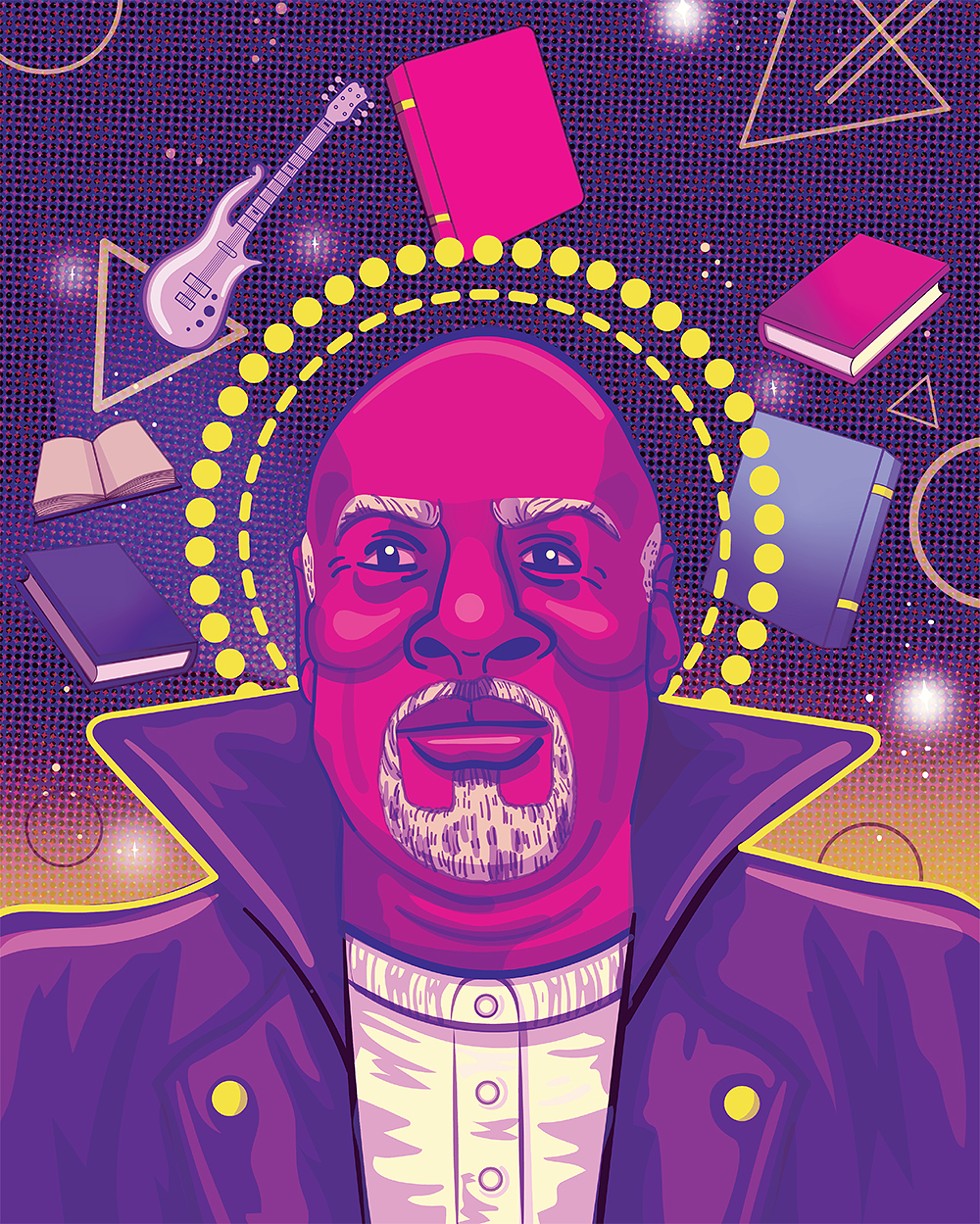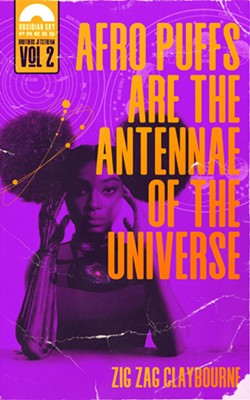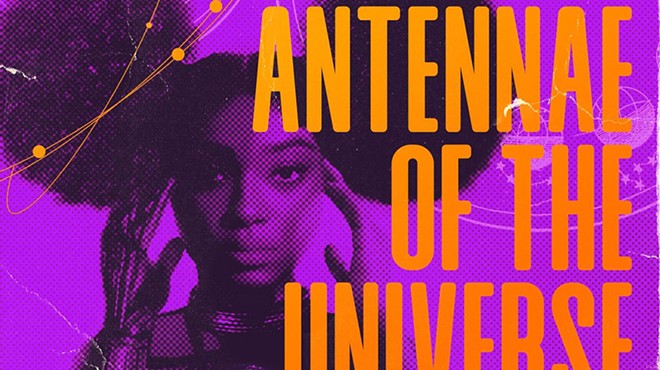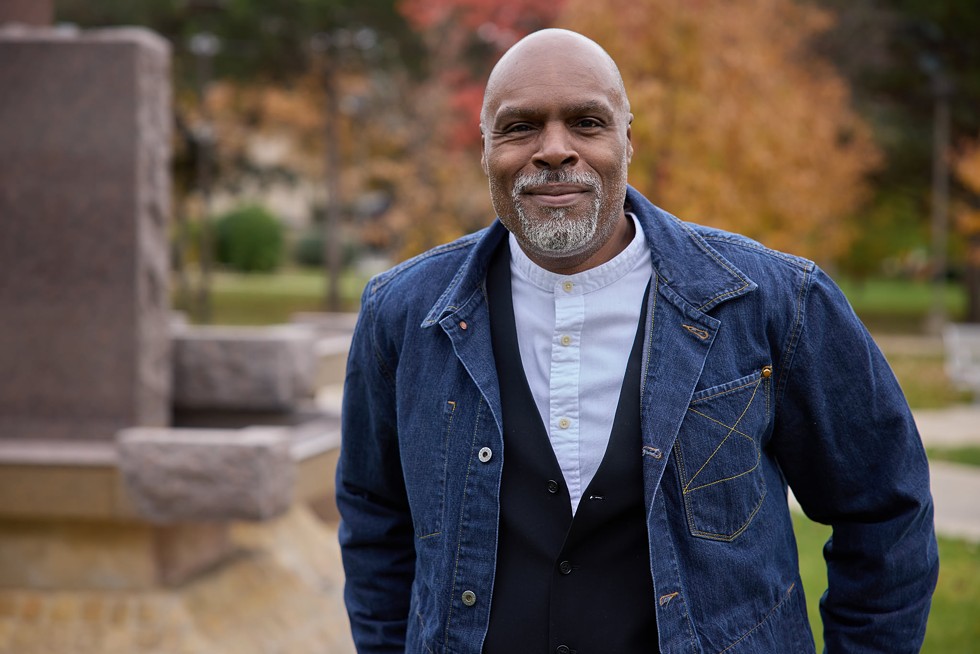A tall, unassuming man with a gray beard and a kind smile sits behind a gnarled tardigrade desk that looks like a massive cutting from, as he calls it, The World Tree. In front of him is a television camera and a crew of hurried people wearing headphones and dressed in black. Behind him, crowding the frame of the camera, are bookcases. One of those books is about to fly into his hand, and the man, Zig Zag Claybourne, is about to take us on a journey to a place he knows well.
The bookcases, draped in purple (for Prince, he writes, the funk), blue (for the sky when you're lying on your back seeing everything, creativity), and green (for life), press in around Claybourne. He can feel them. He can feel them because he's actually read the books behind him, he says, and that's important. There are plants everywhere, too, and those plants have names.
After a quick chat with a producer, Claybourne puts on a knowing grin and grounds himself among the dozens of notebooks filling the desk, fancy ones, dollar store ones, a bunch with hotel logos on 'em. There's enough spiral wire on that desk to make a toe ring for Godzilla.
The director calls, "Action!"
Zig Zag's Speculative Excursion, for children and adults who haven't lost their sense of wonder, has begun. It's a sort of Reading Rainbow for science fiction, a Magic School Bus of speculative literature, a Black, funky, hyperliterate Pee-wee's Playhouse. The tall man stands, gives a nod and a wink directly to the children watching at home, and extends his arm, palm open, Thor-like.
Into his outstretched hand a book flies.
"The book will always be a book about triumph," Claybourne knows. "Not just for the characters, but for the readers, too. That's important to me."
He looks at the title.
"Oh," he says as he runs a thumb over the worn lettering on the cover and looks into the camera with a devilish grin, "this is a good one."
A montage of Claybourne's past adventures rolls over theme music, different every time, and ends with a freeze-frame title screen of Claybourne opening a book and a parade of images arcing across the picture plane like animals walking across a rainbow: a pen and pad, a bathtub, a willow tree, James Baldwin's face, the tail of a dragon, the cover of Kindred by Octavia Butler, Prince's guitar, a galactic swirl.
It looks something like the cover of this week's Metro Times.
When the music fades, Claybourne's soft, smooth voice speaks directly to those at home.
"We have a very special show for you today," he says. "The book we'll be discussing this week is all about a writer. I helped write it. It tells the story of my life, as a writer, as a person, as a fan. We'll be taking a field trip, too, to one of my favorite places, a place called ConFusion, a science-fiction writing convention."
There's a twinkle in his eye.
"I think you're going to like it." he says. "Come on, I'll show you the way."
To be clear, none of this ever happened — at least in the conventional sense. There's no television show called Zig Zag's Speculative Excursion, no books flying magically into his hand, no producers or a Saturday morning broadcast. This was a fiction created by me, the journalist writing this story, and the subject of this story, speculative fiction author Zig Zag Claybourne, to try to get at a fundamental truth.
One of the things you have to understand about Claybourne — given name Clarence Young, 54, author of several influential speculative fiction books, dozens of short stories, and an expert appearing on hundreds of panels and discussions through the years — is "the imagination is real."
"The imagination transformed shit," he wrote to me recently, remembering his childhood in Detroit. "And, if you followed the flow of its power ... it transformed not just in the mind but in the real everyday world."
When I approached Claybourne before the pandemic about writing a profile on him when his new book, Afro Puffs are the Antennae of the Universe, was to be published, I originally wanted to tag along on one of his adventures during a science fiction or writing convention where he is a well-known and well-loved figure, an expert. Not that he claims, to hear him tell it, expertise.
But because the coronavirus has made large crowds both dangerous and immoral, this has become impossible. So we decided we would experiment instead. Together, we would create a character for him, the television host; a television show to frame it, Zig Zag's Speculative Excursion; and travel through the portal of imagination to a convention, in this case a real convention Claybourne attends yearly called ConFusion.
Out of Claybourne's memories and our combined writing skill, we hope to deliver a truth about both the author and speculative fiction while taking you to a place none of us can go until there is a viable vaccine.
If that isn't the heart of speculative fiction, I don't know what is.
Over the last couple of months, more than 25 single-spaced pages of letters have arrived in my mailbox from Claybourne. We've tried to explain what Zig Zag Claybourne at a convention looks and feels like, how he might act, what he might say, who he might meet.
What follows is as much a work of collaborative imagination as reportage. All of the details about Claybourne, all of the thoughts and experiences that follow are real: He is actually 54, he writes most of his books under the name Zig Zag Claybourne, he has lived all his life in Detroit, he sometimes wears a purple Prince-style jacket. Anytime a phrase or sentence is italicized, it's verbatim from Claybourne's letters to me.
But the fiction that surrounds it, the character of the television host, the convention — that's real, too, in a sense. Because to Claybourne, the imagination is real. We're hoping you learn not just about Claybourne and his latest book, but we hope you learn something about creativity and community, too.
So let's go.
If Claybourne were to attend a convention as the host of Zig Zag's Speculative Excursion, he would begin by standing in line at ConFusion, holding a microphone and dressed in a Prince-style purple coat. ConFusion is held each year in January at a hotel in metro Detroit and is the oldest science fiction and fantasy convention in the area.
"There are a lot of writing cons," Claybourne explains for the camera, his back to the line and inching closer to the registration table. "Most of the time they combine writing with other disciplines. Michigan's got PenguiCon, ConFusion, and ConClave, just to name three. ConFusion is the one I consider my annual must-go. It's got a great literary bent, but still plenty of fun for sci-fi, anime, fantasy book/movie/gaming fans."
People in all manner of dress hurry about carrying lanyards and small gifts, swag marked with the name of the con and local businesses.
"The ConFusion registration line is a wonderful thing," Zig Zag earnestly tells the camera, channeling brother LeVar Burton of Reading Rainbow. "It's damn near Seussian. You in your travel clothes wait behind a woman in full Darth Maul gear, while snatches of conversation from behind you reveal Naruto's and Dr Who's plans to meet after a panel on Architecture as Cultural Meme. No one bats an eye at the costumes except to wildly appreciate the skill in constructing them. Some of the cosplays are Hollywood quality. Gender, size, none of it matters."
The camera pans to the line, and sure enough, the costumes are effervescent and stunning. Just as Claybourne hugs some old friends and lends a quick hand to the folks running the registration line, he makes a show of holding his camera toward the floor and snapping a photograph.
"Cons are held in hotels," he explains. "For some reason, all hotels have the butt-ugliest carpeting in the world. This is important to my con experience. One of the first things I do when I hit a con space is snap a picture of the carpeting. I got ugly carpet pics from New York, Boston, Troy, Grand Rapids ... DeVos country was a special ugly. I mean, damn."
“It's off to the island," Claybourne says, attendance lanyard and speaker itinerary in hand. From decades of writing, he's sure he's captured the attention of the young audience by now. He knows what he's doing.
"That's the bar. It's where currents deposit writers, agents, fans, publicists, all the writing chess pieces, for a hit of decompression after long flights or commutes." He sweeps his arm behind him to showcase the rollicking bar space. He strolls inside, explaining along the way. A handful of people dressed as comic book characters chat gaily in the corner while folks in casual business attire speak more seriously at the bar.
"I don't drink and I'm not a loud talker, but BarCon is 90% of the fun of any con. It's where you say hi to old friends, meet new ones, sometimes make deals (but that ain't my Jones), have impromptu karaoke, and generally catch up with peeps on what's kept their writing mojo going since last year," Claybourne says.
The film crew takes the obligatory B-roll shot of Claybourne politely ordering a glass of Faygo Rock & Rye soda, then takes a break for their own drinks. Claybourne can relax a bit now, and he invites a writer for the Metro Times to the table to ask some questions before his first panel.
If this were real, the writer would ask him about his latest book, Afro Puffs Are the Antennae of the Universe. The book follows Captain Desiree Quicho and her bad-ass lady crew on a trip to get home — and save the world along the way, of course. It's a sequel to one of Claybourne's best-loved works, The Brothers Jetstream: Leviathan.
Afro Puffs is a rhythmic, swashbuckling adventure with the bones of classic '50s adventure science fiction, the muscled body of '70s Pam Grier films and space westerns, with the healthy brainpan of laugh-out-loud humor and onyx-sharp claws of political commentary. It's the kind of book that comes with a suggested soundtrack accompaniment: Funkadelic, Prince, Kate Bush, and Talking Heads, to name a few of the artists Claybourne was inspired by.
The author takes a long pull off of his Rock & Rye and thinks a minute before answering the writer's question.
"Anything I write, I start with an emotion," he says. "We're on this Earth to make each other feel, yeah? I call it the soul of the book. Always with the soul. That informs everything I want to say. A lot of people start with 'Hey, I've got this cool idea' — that's just mechanics. That's Star Wars or the next Marvel movie unless you add a soul; otherwise, it's 'watch me plot.' The soul of a book is something that ought to stay with readers anytime they think about the book after setting it down.
"Afro Puffs started with a feeling of joyous defiance. I heard the term 'politically correct' one too many times from scowling white dudes and said, fuck it, I'm about to hit every last one of your nerves. A sci-fi adventure that's feminist, humanist, and socialist af, complete with Kirk-style dramatic speeches, because fuck disingenuous mofos constantly screaming about not wanting politics in their fandom. May the ghost of Rod Serling swirl past their heads in their asses and make 'em say, 'Oh!'"
The writer asks him about some of the prominent recent developments in science and speculative fiction, most of which have involved an "anti-PC" backlash against expanding parameters of the genre, mostly racial, sexual, and gender diversity: Gamergate, the brutal online harassment of women in video games; the sidelining of characters of color like John Boyega's and Kelly Tran's in Disney's recent Star Wars films; the "Sad Puppies/Rabid Puppies" spoiler campaigns at the Hugo Awards to deny writers of color and women prizes.
"Identity is perhaps the central question being discussed now, not just in science fiction but in larger culture," the writer posits. "As a genre that's often described as escapist — with some merit, some of it is, although the best is absolutely not — will sci-fi/speculative continue to veer hard into these questions or will it break away?"
“Science fiction that concerns itself with being a toy is a soulless enterprise.”
tweet this
"For the longest time, sci-fi got hung up playing with toys. I'm 54 years old. I still think certain toys are cool, but so is growing up. That static state is my one big complaint about sci-fi. People wanted to prove how smart they were by writing and commenting on the 'science' of stories rather than how mature they were by thinking on the intent of the story, so we're stuck with this toxic fanboi culture of wang wagging over whether ion drive would actually work in a Class D nebula or some shit. When I was a kid, I'd get into debates about the Enterprise versus the Millennium Falcon. I don't get into those debates anymore.
"Science fiction that concerns itself with being a toy is a soulless enterprise. I'm heartened at seeing so many stories coming out via differing lenses, worldwide stories, worldwide viewpoints, worldwide souls. There's still a camp that wants spec fic to continue to tell the same toy stories, stories I call The Help[1] science fiction, where the white protagonist usually learns what it means to be human after some green or blue race suffers in some way; that camp is dying of malnutrition."
He takes a pause and smiles, draining the last few swallows of his Rock & Rye. The bar behind him is becoming animated, yet the author doesn't raise his voice, and the writer must lean in closer to hear what he has to say.
"Five years ago, I said I think we'd see more inward-bound stories, stories that focused on the importance of inner change to effect current/future outer change. Seems I was spot-on. Peep the sci-fi landscape now, and all the major awards are being won by the 'marginalized' — a term I hate because nobody exists on a margin unless they're violently kept there or they've made themselves irrelevant. The Sad Puppies, the Gamergaters — they've made themselves irrelevant because they think all the toys are theirs. The hottest writers now aren't about retreads; they're bringing fresh sensibilities to a world that's shrinking to such a fine point of informational availability we might as well be psychically connected."
With that, Claybourne says it's time for his first panel.
Here's the obligatory biography section: Claybourne was born and raised in Detroit. He writes under the names Zig Zag Claybourne and Thor MF Jones, and occasionally his given name.
He's written five books: By All Our Violent Guides, Neon Lights, The Brothers Jetstream: Leviathan, In the Quiet Spaces, and now Afro Puffs Are the Antennae of the Universe.
He's published numerous short stories in journals and books such as Vex Mosaic, Alt History 101, The Wayne Review, Reverie Journal, Stupefying Stories, Apex, Strange Horizons, GigaNOTosaurus, UnCommon Origins, and Extraordinary Rendition: American Writers on Palestine.
He's also written a series of 50 Shades of Grey satires under his Thor MF Jones alias called It's Turning Purple, I Think We Should Quit.
The moderator of the first panel on which Claybourne appears reads many of these points on his bio.
The panel is titled "Black Speculative Fiction Authors Panel," and in reality, this panel was held by the Cincinnati and Hamilton County public library via Zoom as part of their programming on Black Speculative Fiction Month and broadcast Oct. 27, 2020.
We're putting it here, as part of Claybourne's ConFusion experience, as the essence of speculative fiction is human psychology in the face of the otherworldly. It often aims to mirror emotional or intellectual truth rather than scientific actuality. Speculative fiction uses monsters and aliens and time travel — or as in the case of this piece, the melding of different realities — to reach a deeper truth, to teach us something about humanity, rather than about science.
Claybourne explains the difference between speculative fiction and sci-fi this way: "It's really a distinction of intent. Speculative fiction equals I can do anything I want. I can cross genres, I can mix genres (which I love); an easy way to think of the distinction is think Twilight Zone versus Star Trek. Twilight Zone would be speculative: big, broad playground between sci-fi, fantasy, horror; Trek is sci-fi. Speculative fiction is not concerned so much with the whizbangs and whuzzits, whereas science fiction tends to view those as indispensable."
Did this panel actually happen? Yep. Did this panel actually happen at ConFusion? Nope. Are these definitions all up for debate? Of course. But is this about to reveal something about Claybourne and the science fiction community that we wouldn't have been able to achieve with a strict adherence to reality?
Absolutely. Back to the panel.
After initial discussion of what drew each panelist to the genre, Claybourne talks a little bit about how he got started.
"Back in the day, I was ready to give up on writing," he says. "Especially in the speculative fiction world, there's a tendency to want the same story somebody else wrote last month. And I didn't want to do that. I was getting ready to give up," he said to the moderator, the other panelists, and the very real audience.
"But I live in Detroit. And I reached out to Beverly Jenkins," he says, referring to the esteemed and singular romance writer. "This is like way back in the mid-'80s ... She met with me, and it was this great moment of community where she said, 'Just keep doing what you're doing, have fun with what you're doing, and you will get past all of the other barriers.'
"That was my inroad to [speculative fiction writing]. That sense of community, that sense of fun, and just knowing you can write what you want to write and get it out there."
However, the larger science fiction community wasn't always so welcoming to Clayourne, a situation he knows is all too common.
He finishes the panel with a quote Bill Campbell from Rosarium Publishing told him: "The industry is not built on inclusion. It's on us to deconstruct it and rebuild."
After the panel, Claybourne takes us to what he calls consuite, the refreshments greenroom for anyone with a con badge. He tells a story while picking through some wilted but mercifully free deli sandwiches and pouring himself a Mountain Dew.
Following an offhand comment from his mother telling him to write a book, a teacher at Cass Tech breaking down the plot of Native Son, and receiving an A after writing his first speculative fiction story concerning aliens in Central Park using humans as hunting dogs to bag other humans, Claybourne felt himself at home in speculative fiction.
"At Cass Tech, I became a speculative fiction writer. Not quite science fiction. I guess it could be. There were aliens. But in my mind, I was now part of the sci-fi community I'd grown up loving," he says between bites of potato chips from an individual-sized bag plucked from the end of the food table.
"Yeah. Not so much.
"First convention I ever attended. Star Trek convention. In fucking Dearborn on the downslide of the mid-'80s. I walked in there thinking I'd be welcomed. Brother-frucking-hood, right?
"I have never been made to feel more alien than that day.
"Black teen in jeans and Members Only jacket walks in; a thousand eyes freeze on him. To borrow from a rival franchise, it was as though a million white people cried out ...
"I wish I'd stayed. I wish I'd said, 'Fuck you, I paid my money to be here, I'm getting the full ride.' I didn't. I was by myself in fucking Dearborn. And that's how we thought of Dearborn at the time. Fucking Dearborn. I rushed through a few vendor booths, then I rushed out, caught the bus home, and felt utterly alone for a long time.
"People wearing Spock ears and wearing IDIC necklaces (Infinite Diversity in Infinite Combinations) openly regarded me as if I was in the wrong place. That was my first taste of 'fandom' culture, where imaginative inbreeding is not only accepted, it's encouraged. To this day there are mofos who don't see the screaming disconnect in saying they believe so much in Gene Roddenberry's vision of a hopeful future ... so long as they don't have to change right now."
He crunches some chunks of ice between his teeth and swirls the dregs around in his plastic cup.
"Being Black in sci-fi means you often have to stifle yourself from smacking the shit out of someone. Sometimes it's an old dude who remembers exactly where all the white drinking fountains were, sometimes it's a new boi feeling himself too much. It might not be as prevalent as it used to be, but it for damn sure ain't left the building."
When Claybourne isn't speaking on panels himself, his favorite thing to do at cons is attend readings.
"Author readings are my jam," he says, chauffeuring us into another reading in a hotel ballroom. By this point, the film crew is pretty sure they have what they need and are back in the room reviewing tape. Claybourne is now attending these readings for the sheer personal pleasure.
"Especially an author who's having as much fun with their words as they hope we are. I've been blown away by so many outstanding readings of authors who were new to me. Brandon O'Brien, Stephen Graham Jones, Amal El-Mohtar, C.S.E. Cooney, Linda Addison ... I could name 50 more you need to hear read if you get the chance, all because I looked for something new at author readings."
The other thing you have to understand about Young is that joy is essential to both his life and his work.
After being shunned by an all-white group of Dungeons & Dragons players at Wayne State, he came up with the idea for a Black hero who would later become Milo Jetstream, the titular hero of his beloved novel.
"I wrote The Brothers Jetstream: Leviathan as a present to every Blerd like myself who wanted to save the world but instead got relegated to driving Ms. Daisy. I wanted it to have the spirit of pulp sci-fi, Buckaroo Banzai, Richard Pryor, James Baldwin tearing through William Safire, Black Vulcan from the Super Friends saying, 'Fuck all y'all!' and Pam Grier kicking trifling mofos inna balls."
"The industry kept looking at my words and telling me I didn't exist," Claybourne tells us in the hallway as people file out of the reading. "The rejections might as well have been a recording of 'I love it, but ...'
"I was tired of 'love it, but.' I knew I wasn't a commercial writer. I can dig a good commercial jaunt from someone else, but my own particular writing brain hooks toward the quirk. I'm still that kid looking for broken, weird, odd bits to glue into a new quirk sculpture. And quirk ain't what the Big 5 publishers fill their coffers with. I get that. But by this point in my writing career I was like, 'Bruh, do you.'
"So I did. And it felt fucking glorious."
Afro Puffs is the second book in this universe.
"Afro Puffs has one wish in its heart," Claybourne says, the con in its last day and beginning to have that twilight feeling of winding down. "Amidst fuckery, don't forget to have fun, because fun — to be authentic, real fun — is inclusive. It reaches outward. It builds. I want people to build better for themselves than what people say they can have. No matter what I do the rest of my life as a writer, whether I'm in Detroit or retired on a plot of land in New Zealand drinking imported Rock & Rye while Rosario Dawson flips pancakes in our kitchen, that's probably the only thing worth taking away from Zig Zag's Speculative Excursion. Find the fun in what you do, and build on that."
Claybourne has one final drink in the imaginary barroom of the hotel with the ugly carpet, suitcase for departure by his side.
"This might sound horribly sweet, but my bank account will bear it out: I don't write for money. When I break it down, it's not even that I write to give people anything, even though I'm a big proponent of asking yourself, 'What is the gift?' anytime you sit down to do something creative. I write to receive other people's thunder. I write for that light to come on when the circuit of ideas from me to whoever completes itself and lights up something for both of us. That'd be the only reason to have a show with a World Tree desk."
Now back safe in his televised room of literary magic, in front of the camera once again to dispense one last nugget of wisdom before another episode concludes, Claybourne takes a moment to contemplate both his experience at ConFusion and his writing life.
While the producers set up the scene, we ask him if he has any future wishes for the direction his show is to take.
"I would definitely invite young Black folks to be special guests. LGBTQIA folks. Nerdy folks. Blerdy folks. Folks that bang metal together to stompy beats. Everybody who's been looked at like they're the aliens on this human world. They'd get on the show, feel the flow, make stuff in real time, and fling webs out without even realizing it. That'd be cool. That'd be hella cool. Somebody's always harshing somebody's ability to start. That ain't here on Zig's Excursion. I've harshed my own self enough in life to know I got no interest in doing it to somebody else. Rather folks start something, and I get to watch them realize how far and deep they can go."
When Claybourne is ready, he snaps from his contemplation and the crew begins rolling. In his velvety voice, he elegantly wraps up his con experience in a tight little package, standing before the World Tree desk and holding the book of his life.
As he explains and expands for the young ones, he strolls over to the bookcase, no magic this time, just Zig Zag Claybourne, aka Clarence Young.
He closes the book in his hands, the book he helped write, takes one last look at the cover, and delicately slides it back into the bookshelf. He once again looks into the camera, smiles impishly, and speaks.
"So I guess that catches us up. We're back to the purple, green, and blue room. The World Tree desk. Me hoping everyone watching is holding their hands out, too, to receive their call-and-response joy. That's what art is, right? Our souls call out for something; the universe responds."
Zig Zag Claybourne's Afro Puffs Are the Antennae of the Universe is out now from Obsidian Sky Books and available locally at Source Book Sellers, 4240 Cass Ave., Detroit; 313-832-1155; sourcebooksellers.com.
[1] The Help, a 2009 novel and 2011 Hollywood film concerning race politics in Mississippi during the civil rights movement, has been criticized by Black creators and others as being simplistic, white-supremacist, and containing offensive stereotypes, among other problems. Star Viola Davis has stated she "regrets" appearing in the film and "betrayed myself and my people." ↩
Stay on top of Detroit news and views. Sign up for our weekly issue newsletter delivered each Wednesday.









